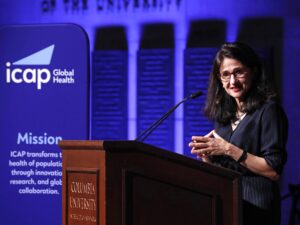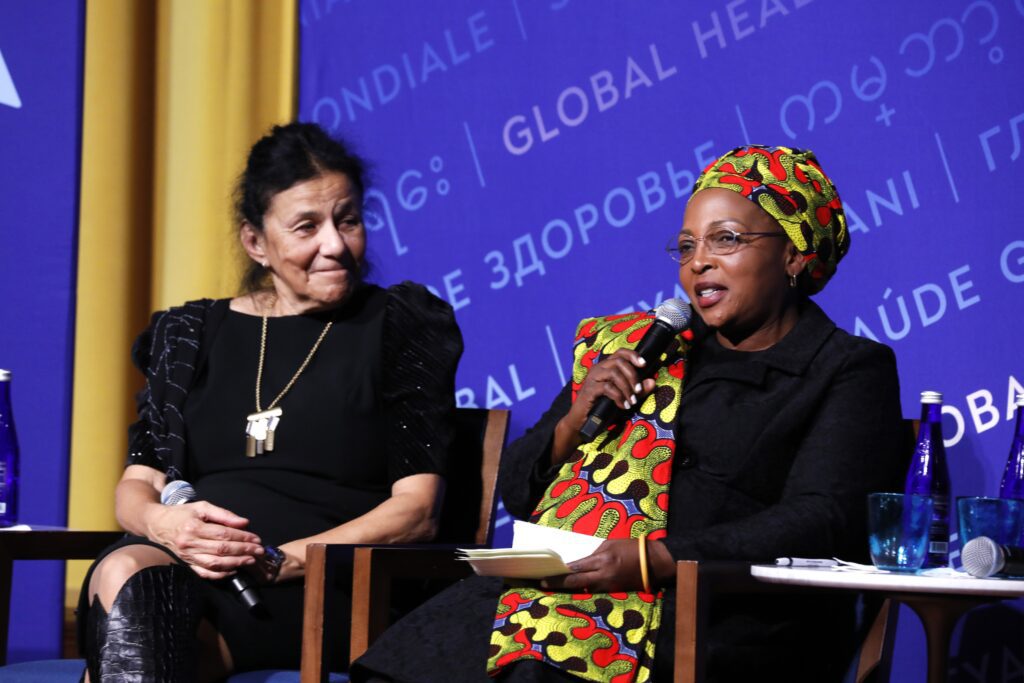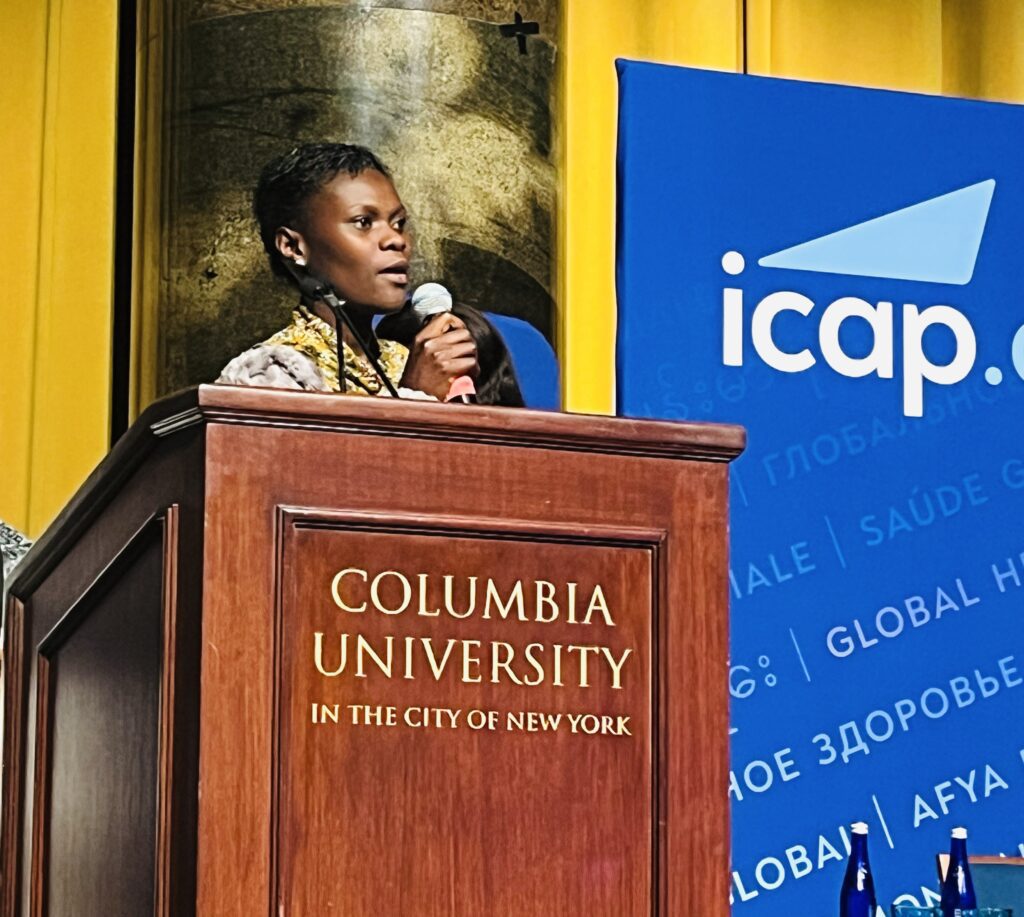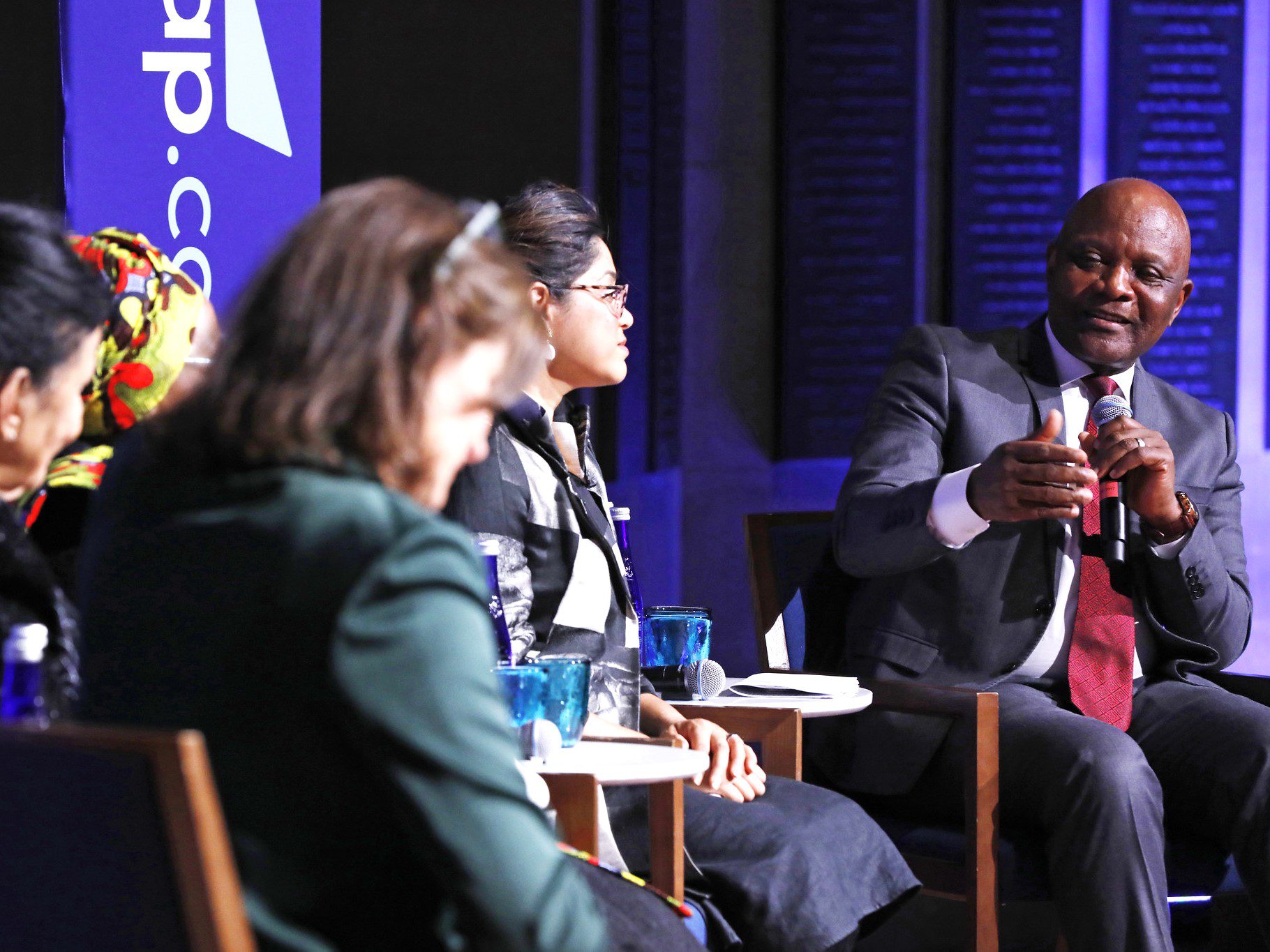On November 9, 2023, ICAP and other global health leaders and experts from around the world joined Columbia University leadership for a celebratory event and panel discussion at historic Low Library at Columbia University. (See highlights from ICAP’s 20th anniversary year here.)
“Tonight, we’re going to hear how [ICAP has] been working to enhance the health of individuals, families, and communities around the world for more than two decades,” said Debra Fraser-Howze, who served as moderator for the event, and once worked alongside ICAP founder and global director Wafaa El-Sadr, MD, MPH, MPA, during the height of the AIDS crisis in Harlem. “This is lifesaving stuff that has touched millions and millions of people and saved millions of lives, in places that face the most daunting health issues imaginable.”
“ICAP’s story for the past 20 years is one of growth, expansion, building trust, and partnership,” she continued.

Minouche Shafik, president of Columbia University, provides opening remarks.
“ICAP was born at a moment of deep inequity, when millions of people in poor countries around the world were suffering and dying of AIDS while there were lifesaving treatments beyond their reach,” El-Sadr explained. “That was the moment ICAP was born, with the determination to make a difference and to stop this inequity.”
“Now, 20 years later we continue to be guided by this passion, a passion for sharing ideas and expertise, a passion for innovation and discovery, a passion for partnerships and collaborations,” she continued. “And what I mean by partnerships and collaborations, I mean deep, strong, constructive, genuine partnerships that are the bedrock upon which we build every project, every program, and every study. This approach has guided us throughout the years even as we have expanded beyond HIV and are now tackling a wide range of global health challenges.”
Notable guests, presenters, and panelists at the evening event included Ambassador John Nkengasong, PhD, U.S. Global AIDS Coordinator and senior bureau official for Global Health Security and Diplomacy; Rose Nyirenda, PhD, director of HIV, Hepatitis & Sexually Transmitted Infections, Malawi Ministry of Health; Angeli Achrekar, PhD, MPH, deputy executive director of the Programme Branch at the Joint United Nations Programme on HIV/AIDS (UNAIDS) and an assistant secretary-general of the United Nations; Minouche Shafik, PhD, president of Columbia University; Katrina Armstrong, MD, chief executive officer of the Columbia University Irving Medical Center and dean of the Faculties of Health Sciences and the Vagelos College of Physicians and Surgeons (VP&S); and Linda P. Fried, MD, MPH, dean of the Columbia Mailman School of Public Health.
In her opening remarks, President Shafik pointed to the significant contribution that ICAP has made to the global response to HIV and AIDS, including over 50 million people tested for HIV and two-and-a-half million people receiving lifesaving antiretroviral treatment.
“But those impressive numbers only scratch the surface of ICAP’s persistent and persistently innovative contributions to global health,” she said. “From malaria to tuberculosis, to maternal and child health, and most recently the Covid-19 pandemic, ICAP has been at the front lines of the greatest global threats to human health.”
The event included a panel discussion moderated by Claire Shipman, a noted journalist and vice chair of Columbia University’s Board of Trustees. The panel included Ambassador Nkengasong, El-Sadr, Nyirenda, and Achrekar and focused on the lessons learned from the global HIV response and how those lessons can be applied moving forward, especially in responding to other emerging health threats.
“The fact that countries have gotten to 95-95-95 targets early is phenomenal,” said Achrekar, referring to UNAIDS’ goal that by 2030, 95 percent of people living with HIV will know their HIV status, 95 percent of people who know their status will be receiving HIV treatment, and 95 percent of people on treatment will have a suppressed viral load with its associated individual health benefits and decreased likelihood of their infection being passed on is greatly reduced.
Ending AIDS as a public health threat by 2030, however, would require “unrelenting persistence,” she said. “We cannot let our foot off the pedal.”

Rose Nyirenda, Malawi Ministry of Health, discusses Malawi’s dramatic turnaround in terms of HIV prevalence in the past 20 years, while ICAP global director Wafaa El-Sadr looks on.
Nyirenda spoke of the dramatic turnaround in Malawi since 2003, when HIV prevalence was as high as 23 percent in some cities, and 80,000 people were dying from AIDS annually, a shocking number for a population of only 12 million.
“Most of the people who were dying were those in the productive age,” Nyirenda said. “Malawi was losing its human capital, which is needed in all sectors of the economy.”
That grim story changed for the better, she said, in large part because of the global partnerships that began working with the government, including the Global Fund, PEPFAR, the United Nations, the World Health Organization (WHO), and, of course, ICAP. Today, for example, the HIV incidence rate is 0.03 percent, a dramatic drop from 4.2 percent in 2003.
ICAP has been one of those institutions that have contributed to supporting Malawi’s health systems, particularly human resource for health,” Nyirenda said. “Our data systems are stronger, and we continue to use evidence for our strategic decisions. And let me mention that ICAP is also one institution that has been trusted by the government of Malawi.”
She also emphasized the ongoing importance of global partnerships for Malawi—and countries everywhere—to sustain its HIV achievements, including the provision of antiretrovirals (ARV) for its population of people living with HIV.
“The global partnerships will be needed not just financially, but even the technical assistance, even the expertise that organizations like the World Health Organization have, even sharing best practices,” Nyirenda said.
During the panel discussion, El-Sadr emphasized again the vital importance of partnerships when tackling a global health challenge like HIV, explaining that “the principle of partnerships” has been one of ICAP’s core founding philosophies since its creation.
“You have to really work on building partnerships,” El-Sadr said. “It’s not that you walk in and say ‘we’re going to be your partner’; it’s not going to work that way. It means you walk into a situation, and you listen, you listen … and you try to understand what are the real priorities of the people who live there, the people who work there, the people who are committed to these countries.”

Gloria John, a Tanzania DREAMS participant, speaks of how ICAP and the DREAMS program has helped to change her life and the lives of other women and young girls.
After the panel discussion, Ambassador Nkengasong and El-Sadr presented an award of appreciation to two representatives from the DREAMS program in Tanzania, Gloria John and Irene Joseph. DREAMS—which stands for Determined, Resilient, Empowered, AIDS-free, Mentored, and Safe – is a PEPFAR-supported program through the U.S. Centers for Disease Control and Prevention (CDC) that is supported in Tanzania by ICAP. DREAMS provides adolescent girls and young women enrolled in the program with economic strengthening and income-generating opportunities, mentorship, and coaching along with information and education about safe sex practices, and the provision of HIV testing, condoms, family planning, and pre-exposure prophylaxis (PrEP).
“What we do is make friends with them first, then gradually you start teaching them to use condoms and preventive medicines that prevent HIV infection,” explained Joseph, who is a mentor for the Tanzania DREAMS program. “There is another education for small-scale entrepreneurship. We teach them how to make soap, cake, sewing, make batik, while they are getting health education and entrepreneurship education.”
Gloria John ended the evening with words of gratitude for ICAP, and the way it has changed her life for the better, both her health and her opportunities for the future, a sentiment that serves as inspiration for all of ICAP as it embarks on its third decade of service to global health.
“Before joining DREAMS I was a sex worker, I was engaged in different high-risk behavior. But now I am more independent. I have received a lot of health education, and I am now taking care of my health, and also educating other girls. Thank you DREAMS and ICAP for the support.”
About ICAP
A major global health organization that has been improving public health in countries around the world for two decades, ICAP works to transform the health of populations through innovation, science, and global collaboration. Based at Columbia Mailman School of Public Health, ICAP has projects in more than 40 countries, working side-by-side with ministries of health and local governmental, non-governmental, academic, and community partners to confront some of the world’s greatest health challenges. Through evidence-informed programs, meaningful research, tailored technical assistance, effective training and education programs, and rigorous surveillance to measure and evaluate the impact of public health interventions, ICAP aims to realize a global vision of healthy people, empowered communities, and thriving societies. Online at icap.columbia.edu








